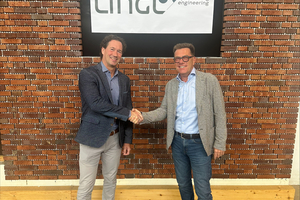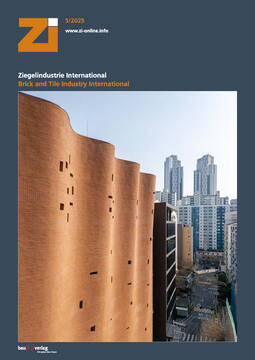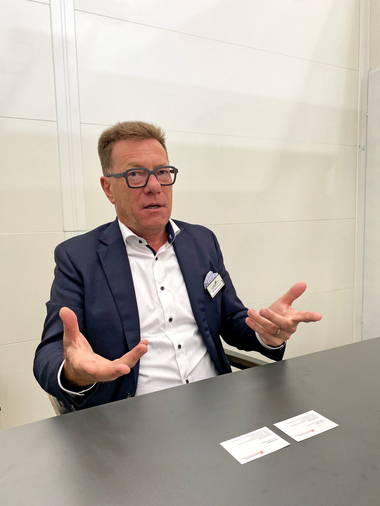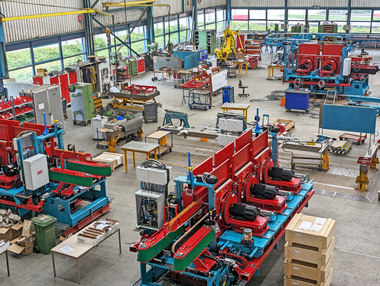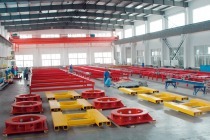LINGL SOLEAD GmbH: Shaping the future, preserving tradition – introducing the new managing director Thomas Weischer
On a summer’s day in the first half of July, Hermann Frentzen, majority shareholder, Thomas Weischer, co-managing director/CEO of LINGL SOLEAD GmbH, and Victor Kapr, editor of ZI Ziegelindustrie International, got together to discuss the latest developments at the Krumbach-based machine and plant manufacturer. In this interview, you can find out how the Swabian company is doing after more than a year under new management, what plans the new CEO has for the future, and why it is crucial to do more for customers than just provide them with a functioning plant.
Update on LINGL SOLEAD GmbH
Mr Frentzen, we last spoke at the end of last year. At that time, you were confident about the annual financial statements. You have now been at the helm of LINGL SOLEAD for more than a year. How is the situation in Krumbach?
Hermann Frentzen (HF): The first step has been taken, and the company has been saved from liquidation. The first consolidated annual financial statements showed a positive result. Overall, 2024 was a successful year. We almost achieved the total output we had set ourselves. The equity ratio is even a few percentage points above target. Our consolidated balance sheet shows an equity ratio of 43 %, which is certainly very respectable for a plant manufacturer in today’s circumstances. In addition, we now also have a portfolio of guarantors and corresponding guarantee lines that suits us.
We are currently taking the second step, namely my retirement succession. This is not about my retirement, but about securing the future of the company by building up a new generation.
That is why Thomas Weischer joined me as managing director at LINGL SOLEAD on 1 June. He comes from the Swabian region and has a wealth of experience in plant engineering.
About Thomas Weischer and the succession of Hermann Frentzen
Mr Weischer, what is your background?
Thomas Weischer (TW): I originally wanted to become a civil engineer, but I felt I needed to do an apprenticeship before going to university. That had a significant influence on my choice of degree programme. While I was training as a road builder, I realised that I wasn’t particularly interested in construction and statics as disciplines, but that I was much more interested in managing projects. That’s why I went on to study a combination of civil engineering and project management. After graduating, I worked as a project manager in infrastructure construction for two years before moving into plant engineering. There I was able to work in various areas and get to know different industries: mechanical-biological waste treatment plants, environmental technology, recycling for plastics and batteries, and plastics manufacturing.
I started in project engineering and as a project manager. The next step was senior project manager for turnkey plants. Then I moved into sales and became sales manager and later division manager. Before joining LINGL SOLEAD, I was head of business development at Hosokawa Alpine Aktiengesellschaft in Augsburg, a machine and plant manufacturer.
To amend Mr Frentzen’s statement: yes, I am a plant engineer through and through. Although I don’t have any specific experience in heavy clay, I think my experience is easily transferable.
Why did you move from project management to sales?
TW: Even during my time as a project manager, I realised that I enjoyed advising customers. I also often accompanied my colleagues from sales in the run-up to projects. Ultimately, it was the logical next step for me to move directly into sales.
That sounds like good qualifications for the management of a plant manufacturer like LINGL SOLEAD.
TW: Yes, after a few discussions, Mr Frentzen and I also realised that it could actually be a good fit. The first six weeks confirmed this. With the tools I’ve acquired over the last few years, I feel very much at home here. I’m glad we got to know each other and that I took this step.
Where and how did you meet?
TW: We got talking about a job advertisement for the sales management position for new markets. We didn’t end up working together for that vacancy. But Mr Frentzen offered to stay in touch. I was pleased about that. At some point, he contacted me. He said he had thought about it and believed that I could do more. We then compared our respective ideas in several discussions and came to an agreement.
Are you now getting to know the company and the heavy clay industry?
TW: Yes, I’m still in the orientation phase. I am talking to all the division managers and want to understand how LINGL SOLEAD functions. Because behind the existing structures and processes there are reasons and a history as to why they are set up the way they are. Once I have understood that, I want to apply my experience from other companies and see where we can adjust and adapt things. Mr Frentzen and I have already discovered one or two issues.
How long will you be managing LINGL SOLEAD together?
HF: The initial agreement with Thomas Weischer is that he will become a shareholder after one year of management. This is because LINGL SOLEAD is to remain an owner-managed company. I will remain the majority shareholder and continue to be involved as an ambassador and networker for LINGL SOLEAD. But I want to avoid as a member of the management team being carried into the office at 9 a.m. because I can’t let go. The company and its employees deserve a vision for the future. I want to shape that proactively. With Mr Weischer, the first step has been taken, and more will follow. We still have a lot to do.
What do you mean?
HF: For example, we are currently taking on four trainees who have completed their training. These employees, who are in their early to mid-20s, need a generation in management who can show them a plausible vision. Mr Weischer will be responsible for this. The technical area is another example. The technological developments surrounding brick production, electronics, control technology and digitalisation technology are sensational, but very demanding. At LINGL SOLEAD, we are currently addressing the topic of AI in plant engineering. Mr Weischer will also be responsible for its structured implementation within the company.
AI and plant engineering
What opportunities does AI offer in plant and mechanical engineering?
HF: AI can be very helpful in the preparation of documentation, and in some circumstances also in the preparation of historical data. We have already worked extensively with AI internally in the areas of market research and corporate research.
TW: AI can also help in design, for example. This is because there is a lot of logic behind designs that AI can recognise. When I am planning a plant, AI can perhaps generate a proposal for a spare parts catalogue at the same time as I am designing the plant.
In addition to increasing efficiency in plant construction, there is another point for me. How can we use AI to generate benefits for our customers? We can integrate AI into our control systems, for example in the context of predictive maintenance. If the plant detects that a certain component is reaching its wear limit, it can automatically send a signal and request a quote.
HF: To implement this, we need management and the entire company to be willing to use AI. We must not view it solely as a threat. The aim of using AI is not to send people home, but to make our performance more sustainable, faster and more individualised and, in the best case scenario, to double our turnover.
TW: It is very important that we make it clear that we want to use AI to generate more performance for the benefit of all. Then everyone will be more likely to support it.
General contractor for the customer
It sounds as if you still have a lot to do within the company.
HF: Together with Mr Weischer and our other colleagues, I would like to give LINGL SOLEAD a new dynamic, whether it be for the use of AI or, for example, for the development of a new generation of machines. To do this, we first need a technology-open approach. The second is a corporate culture where we can talk about truths and want to take risks again. Due to the high personnel costs in Germany compared to other countries, we are forcing ourselves to become faster and more efficient without compromising our high quality standards for our customers. ‘Otherwise, the pike will overtake us in the carp pond of the plant engineering and brick industry.’
We will not outsource anything. But we will certainly collaborate more closely with other companies and become more effective through new technologies such as AI or component purchasing. The internal structure of the entire company will change dramatically over the next five years. LINGL SOLEAD will become more efficient in its services to customers.
Encouraging LINGL SOLEAD to come up with extraordinary ideas has worked quite well so far. We have now been able to develop a different level of acceptance and culture within the company. I consider this to be an important basis for the further development of the company and its employees, which the new CEO will continue to promote.
What opportunities do you see for LINGL SOLEAD to survive in the market despite significant discrepancies in labour costs?
HF: When I took over LINGL SOLEAD, I was well aware of the high labour costs associated with the many demanding high-tech jobs here. I decided to join the company because I believe it has a bright future. This included continuing the existing wage structure.
We can only compensate for the price discrepancies in areas such as pre-sales and after-sales service. As I have already said (see ZI 1/25, p. 6f.), we must work with our customers to address their issues and develop their projects. The aim is to avoid getting into a situation where we have to compare prices with the competition in the first place. To do this, we need to break new ground and think outside the box.
We are pursuing this approach in England, for example. I believe I can say that we are very far ahead there in hydrogen projects. The British government has launched a comprehensive programme to promote the use of hydrogen over the next 20 years. We have already held hydrogen workshops with the three largest brick manufacturers in England. We were also the only brick plant manufacturer at the UK Ceramics Delivering Net Zero Conference, a ceramics industry meeting on sustainable manufacturing processes.
So you will focus on innovation?
HF: It’s about more than just a technological edge. The difference must be that LINGL SOLEAD, as a general contractor, takes full responsibility for a project and gives the customer the security of successfully realising their flagship project together. We are well on the way to regaining this trust. In March, we received an order worth several million dollars from the largest brick manufacturer in the USA with a turnover of 750 million dollars. Thomas Weischer will take up and reinforce this momentum.
TW: That is a very important insight. To put it bluntly, we must not sit opposite the customer, but at their side. They must feel that we are not advising them in order to sell the largest possible plant, but because we are convinced that this will be the best solution for the customer. This is reflected in the fact that we also take future technical changes and innovations into account in our planning – keyword ‘printing’. This ensures that our customers are truly prepared for the future.
Our core competence at LINGL SOLEAD will encompass the complete process know-how of a plant, including not only technical expertise but also the appropriate project management. The customer should receive a functioning plant that corresponds to their order at the right time, enabling them to be successful immediately.
HF: This also includes providing emotional support to the customer. Many brickmakers are rightly respectful and somewhat wary of large investments. We need to allay these fears for our customers. With us, they should gain the confidence that the project will be successful and that we will ensure that it runs sustainably.
What does the further order development currently look like?
TW: We are well utilised until the end of the year. The project pipeline for the future also looks very good.
HF: We are on the right track when I look at where we started 12 months ago. Every week, another piece of the puzzle falls into place. The team has made a lot of changes, the processes are back on track, the mindset of the employees is changing in the right direction, and we are humbly delighted with our successes in working with customers.
The market environment is not exactly ‘fun’ at the moment, but we are convinced that the sun will shine again in 2026 – we are ready for it and looking forward to it!
Mr Weischer, so you don’t feel like you’re boarding a sinking ship?
TW: No, absolutely not. I knew from the outset where the company came from and what its history was. I looked into the company’s issues and the market, and I see great potential in both. After all, I wasn’t forced to take a new job, but I recognise opportunities when they arise.

